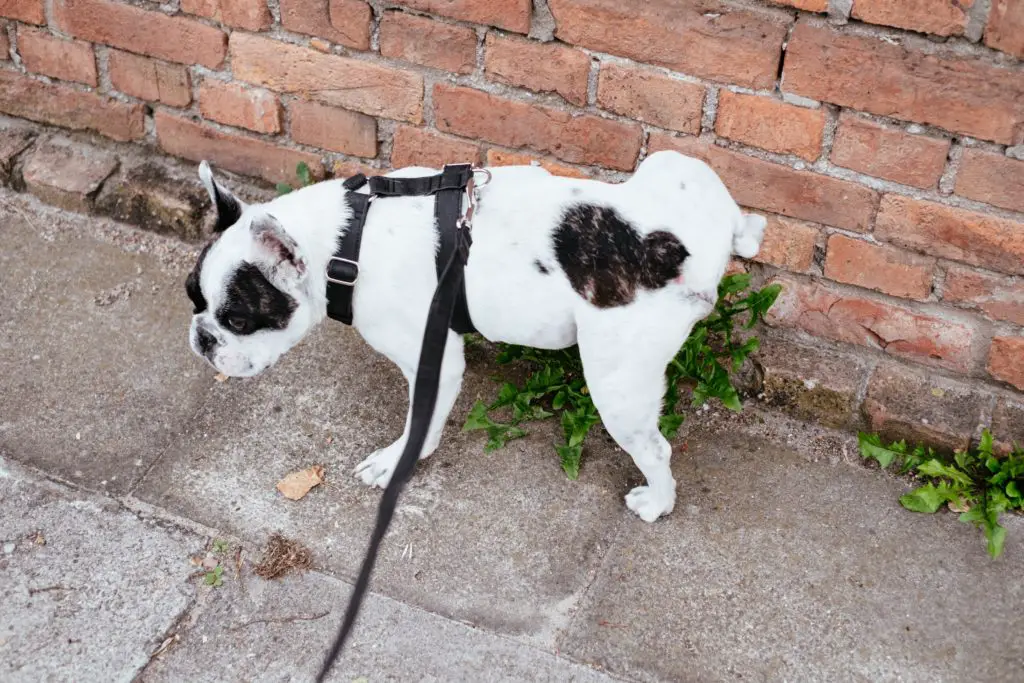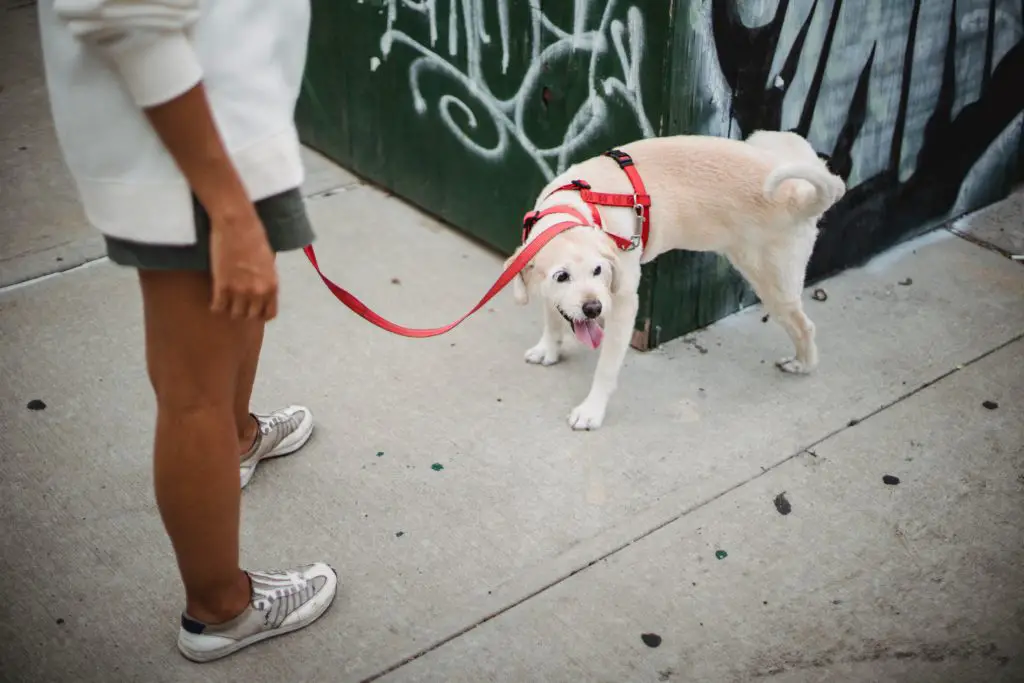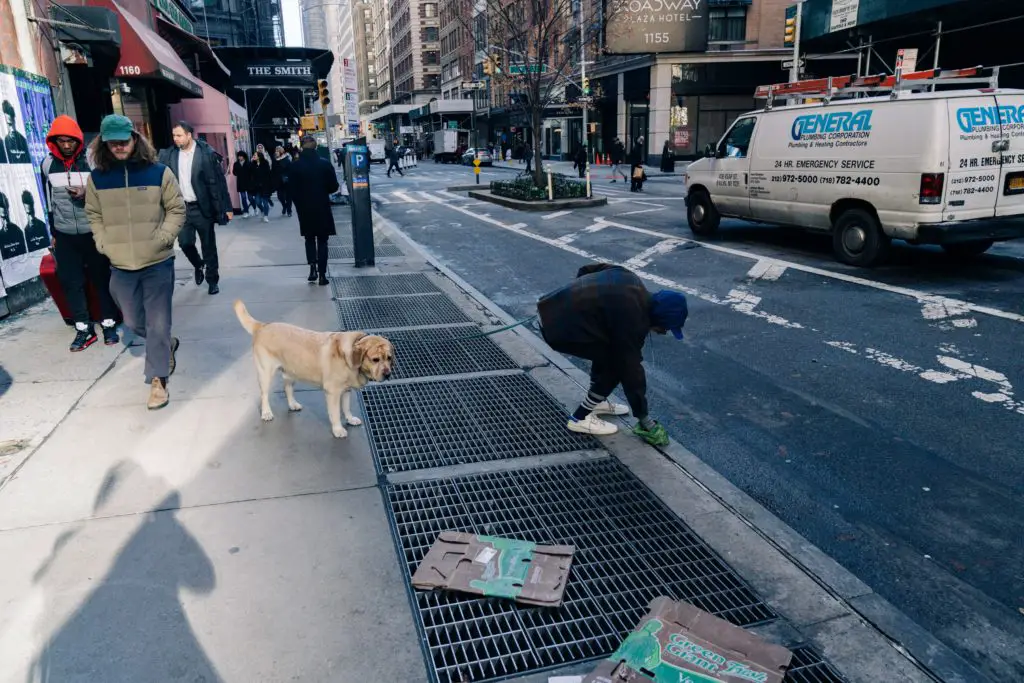One of the very first steps after picking up your puppy is learning how to housebreak or potty train your puppy.
Whether you are a first time dog owner or it’s been a few years since you brought a puppy home, a reminder on how to housebreak or potty train your puppy is welcome.

In this article, how to housebreak or potty train your puppy, you will learn about the supplies needed for easier house training, signs that puppy needs to go out, and five tips to help you and your pup be successful at house training.
Lastly, we will look at the four most common questions asked by dog owners. The answers will hopefully provide you with possible solutions about house training a puppy.
When should you begin? House training begins the moment you pick up your puppy. In order to be successful, it will take planning and being consistent on your part. You will develop a new habit of taking your puppy out frequently for the next four months.
Keep in mind, puppies take approximately 20-30 weeks to develop bladder control. However, this varies from dog to dog and breed to breed.
Related Articles:
- Rules of How to Walk Your Dog
- How to Train Your Dog to Walk on a Leash
- The Top 5 Basic Dog Training Commands
- How to Obedience Train Your Dog
- How to Clicker Train Your Dog
How to Housebreak or Potty Train Your Puppy: Necessary Supplies
Set yourself up for success by having your pup wear a collar and keeping a leash nearby. It’s goes smoother for all if you plan ahead and know your designated potty area. Have these additional supplies at your fingertips:
Our website is supported by our users. We sometimes earn money when you click an affiliate link and make a purchase. This is at no extra cost to you and helps us to create quality content. Thank you for your support.
PoyPet 2019 Upgraded No Pull Dog Harness with 4 Snap Buckles, Reflective with Front & Back 2 Leash Hooks and an Easy Control Handle [NO Need Go Over Dog’s Head] (Pink,M)
- 4’ – 6’ leash
- Indoor dog crate
- White vinegar or enzymatic cleaner for puppy messes
Rocco & Roxie Stain & Odor Eliminator for Strong Odor - Enzyme-Powered Pet Odor Eliminator for Home - Carpet Stain Remover for Cats and Dog Pee - Enzymatic Cat Urine Destroyer - Carpet Cleaner Spray
$19.16 in stock
- Spray Bottle
- Baking soda
- Paper towel
- Travel clean-up kit (paper towel, plastic bags, cleaner in a spray bottle)
- Baby wipes for messes on fur or paws
Remember, when your puppy messes in the house, it’s best to clean it up right away. This simple action communicates to the puppy that is not the area for eliminating.
Q: How should I respond when my puppy begins to urinate or defecate in the house?
- If you “catch” them in the act, make a startling noise (Ahh!) and move them outside immediately. Often the noise will make them pause with enough time for you to get them outside.
If they have completed the act, take them out anyway and come back to clean up the mess.
It’s important to use cleaning supplies that do not contain bleach or ammonia. Many household cleaners contain ammonia which closely resembles the scent of urine to a dog.
Thoroughly cleaning the accident spots with an enzymatic cleaner will eliminate lingering odors. White vinegar in a spray bottle works exceptionally well. It cleans and deodorizes the site of the accident.
Related Articles:
- A Review Of The Top 5 Best Dog Whistles
- A Review of the 5 Best Dog Muzzles
- A Review Of The Top 5 Best Dog Clickers
- How to Build an Outdoor Dog Potty Area on Concrete
Always remember, when you are unable to watch your puppy, place them in a safe location like an indoor crate. In general, puppies do not like to soil the area where they sleep and rest.

How to Housebreak or Potty Train Your Puppy: Know the Signs
Puppies usually give us a few seconds notice when they need to urinate or defecate. Although there are times that they will squat right in the middle of play.
PetSafe Pet Loo Portable Dog Potty, Alternative to Puppy Pads, Large
PoyPet 2019 Upgraded No Pull Dog Harness with 4 Snap Buckles, Reflective with Front & Back 2 Leash Hooks and an Easy Control Handle [NO Need Go Over Dog’s Head] (Pink,M)
Rocco & Roxie Stain & Odor Eliminator for Strong Odor - Enzyme-Powered Pet Odor Eliminator for Home - Carpet Stain Remover for Cats and Dog Pee - Enzymatic Cat Urine Destroyer - Carpet Cleaner Spray
$19.16 in stock
Exercise or movement often triggers the need to eliminate. Here are other signs that your puppy needs to go outside:
- Wandering away from the area where they were playing
- Circling while sniffing
- Looks distracted
- Sniffing at the floor or carpet
- Looking at the door or pacing near the door
- Beginning to squat
- Wandering over to an area they had previously eliminated
Keep in mind, it’s not the puppy’s fault they have to urinate or defecate. Learning how to housebreak or potty train your puppy is all part of caring for a new puppy. We need to be consistent on teaching them the proper location and noticing their indications.
Now, let’s look at how to quickly and successfully house train a puppy.
Related Articles:
- How to Treat a Dog Ear Infection at Home without a Vet
- How to Play with Your Dog
- Rules of How to Walk Your Dog
- Tips for First Time Dog Owners
How to Housebreak or Potty Train Your Puppy: Tips for Successful House Training
- Designate a puppy safe area in your home; either by using a crate and/or gating off rooms in your living space.
- Walk outside with your puppy (on a leash) to show them where to eliminate, don’t leave it up to them. You will know if they just relieved themselves a tiny bit or did the job right.
- At the beginning of house training, using a leash to direct them and keep them focused on the task is important. Puppies can get easily distracted and desire to explore.
- Always supervise your puppy. When you need to leave the room or talk on the phone, place them in a safe area.
- Set a timer, if needed, to help you get in the habit of bringing your pup out every ten to fifteen minutes.
Being conscientious of how to housebreak or potty train a puppy is not hard, it’s more of being aware of your puppy every moment they are awake. That is such an important aspect those first several months of puppy care. If you are unable to tend to them, place them in their safe area or designated dog crate.
You will need an abundance of patience and persistence when it comes to house training. It may take your puppy anywhere between two days up to two weeks to know where to eliminate.
When learning how to housebreak or potty train your puppy, keep this checklist handy each day:
Take your puppy outside:
- After several minutes of play
- When they wake up from sleeping or napping
- Before and after car rides
- After greeting a family member or friend
- Before and after training sessions (or formal training)
- After eating or drinking
- Before and after putting them in their dog crate
Reinforce your puppy with lots of praise when they eliminate outside. Some training methods encourage giving your puppy a treat every time they eliminate in the right location. It’s really up to your personal training style; praise works well and treats work fine too.
Related Articles:
- Ultimate Guide: How To Take Care Of A Puppy
- Ultimate Guide: How To Take Care Of A Dog
- Ultimate Guide: How To Take Care Of A Senior Dog
- The Benefits of Owning a Dog
- Top 12 Tips for First Time Dog Owners
- How to Train a Dog
How to Housebreak or Potty Train Your Puppy: 4 Common Questions
If this is your first time bringing a puppy home or it’s been a few years since you have potty trained a puppy, you might relate to these common questions.
Q. My puppy was successful for many weeks, now they have regressed, what is wrong?
A. Puppies have ups and downs as they mature. Monitor their water consumption and be consistent with taking them outdoors. If it persists, have them looked at by your local vet to rule out any health issues.
Q. What about using doggie diapers?
A. If you rescued or adopted an older dog, they might not be housetrained. Doggie diapers could be used in case an accident occurs. They are also handy as a back-up when visiting friends and family. You still need to be diligent about training them to go outdoors.
They are also good for dogs that are incontinent and will unknowingly urinate while sleeping. These are a very good and reliable brand. Just be sure to also purchase these pads to switch out when they get soiled otherwise you will be going through a lot of diapers. And that means extra laundry.
Related Articles:
- Basic Dog Training Commands
- How to Properly Carry a Dog
- How To Take Care Of A Puppy
- How To Take Care Of A Dog
- How to Obedience Train Your Dog
Q. Does using a “potty bell” increase my success?
A. Some dogs and owners do very well with a bell. The dog will ring the bell when they need to be let outside to eliminate. This system works well for travelers as well because you can bring the bell with you. The bell becomes more guesswork when you have a smarty dog that will ring the bell for attention or just to go outside to play. Using a bell system is up to the individual dog and owner.
Q. When will my puppy sleep through the night?
A. It really depends on the size and breed of your dog. Generally, 8–12-week-old puppies can go approximately four to six hours (during the night) at the start of housetraining. Continue to take them out right before you go to bed at night. Sometime between 12-16 weeks, they will extend that time to 6 hours and eventually 8 hours.

How to Housebreak or Potty Train Your Puppy: Summarized
A few key points to remember when learning how to housebreak or potty train a puppy is each puppy and dog have their own individual characteristics, which plays a part in how quickly or long it takes for them to grasp the concept of where to eliminate.
Verbally reprimanding your puppy only teaches them not to eliminate in front of you. Speaking harshly to a puppy because we are frustrated will not make them learn quicker.
Related Articles:
- A Review Of The Top Five Best Foods for Hiding Dog Pills In
- A Review of the Top 5 Best Dog Bones For Aggressive Chewers
- How to Get a Picky Dog to Eat
- A Review Of The Top 5 Best Bone Broths for Dogs
Learning how to housebreak or potty train a puppy can be a breeze for some dogs and their owners and other times it feels like it takes forever.
Remember to be patience and persistent. You will want to acquire the cleaning supplies and keep them at your fingertips when the puppy is moving out and about. Know the signs of when your puppy is about to eliminate and defecate.
Keep reminding yourself every day that your puppy needs supervision when they are awake. Dog crates are wonderful tools for keeping puppy safe and gives you peace of mind. Go through the checklist of when to take your puppy out.
As humans, we can do our part by being consistent, timely and patient!
Please read our Legal Disclaimer

![PoyPet 2019 Upgraded No Pull Dog Harness with 4 Snap Buckles, Reflective with Front & Back 2 Leash Hooks and an Easy Control Handle [NO Need Go Over Dog’s Head] (Pink,M)](https://m.media-amazon.com/images/I/51FxtoX+crL._SL500_.jpg)


